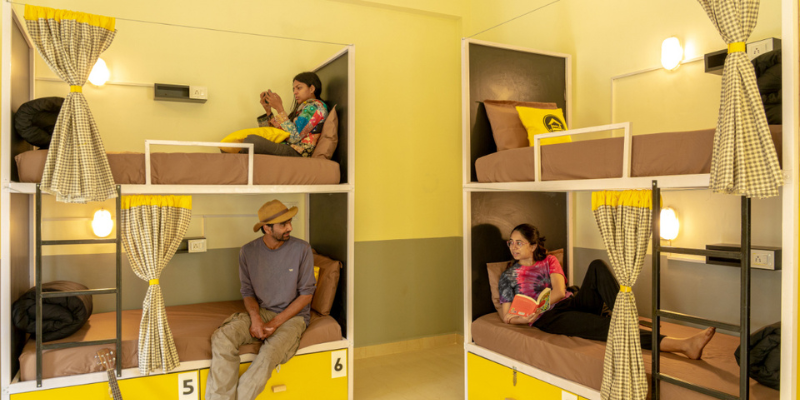Startup
Govt plans to issue ALMM for solar PV cells to push India’s green energy transition

The government is planning to introduce an Approved List of Models and Manufacturers (ALMM) for solar cells on the lines of module manufacturing to boost India’s transition towards green energy.
The government aims to make the second list (List II) under the ALMM for solar PV cells effective April 1, 2026.
The government introduced the ALMM order (List I) in 2019 for solar modules to boost the manufacturing and usage of made-in-India solar panels. It was made mandatory to source PV modules from models and manufacturers included in the ALMM List I.
According to an office memorandum of the Ministry of New and Renewable Energy, the ALMM order dated January 2, 2019, specified models and manufacturers of solar PV modules, whereas List II will identify and include models and manufacturers of solar PV cells.
However, to date, List II of solar PV cells has not been issued because the installed capacity of solar PV cells in the country was lower than the demand, the government document said.
“With installed capacity of solar PV cells in the country expected to increase substantially in the next two years, it has been proposed to issue List II of solar PV cells under ALMM, which shall be effective from April 1, 2026,” according to the draft amendment to ALMM order for implementation of ALMM for Solar PV cells.
The draft paper also proposed that the solar PV modules—which are presently enlisted in ALMM List-I (for solar PV modules) with an expiry date beyond Mach 31, 2026—will also have to use solar PV cells included in ALMM List-II (for solar PV cells) from April 1, 2026, onwards.
If the modules don’t have the cells included in List-II, they will be liable to be delisted from ALMM List-I, as per the draft.
“All projects where the last date of bid submission is before the issuance of this order shall stand exempted from the mandatory requirement of using solar PV cells from ALMM List-II,” the draft said.
Sustainable Projects and Developers Association (SDPA) President Vineet Mittal said the introduction of an ALMM mechanism for solar cells will boost domestic manufacturing by ensuring that only approved, high-quality, and reliable products are used in government-backed projects.
This will promote self-reliance in the sector and significantly reduce dependency on imports, which is crucial for achieving India’s long-term renewable energy goals, he added.
Yogesh Dua, Co-founder of UTL Solar, said, “We welcome the efforts being taken by the government to make the industry more sustainable. It will not only push the vision of 500 GW but also meet our goals. The move will also benefit consumers with efficient solar projects.”
Startup
Prabhuji snack maker Haldiram Bhujiawala raises Rs 235 Cr

Kolkata-based packaged snack company Haldiram Bhujiawala has raised Rs 235 crore through a private placement from Pantomath’s Bharat Value Fund (BVF) for a minority stake.
The snacks maker, which retails under the ‘Prabhuji’ brand, registered a revenue of Rs 473 crore for FY23 while profits declined to Rs 1.7 crore for the year, according to data sourced from research platform Tracxn.
The company was established in 1992 by Manish Agarwal and Prabhu Shankar Agarwal and retails Haldiram’s Prabhuji and internet-first brand, . It has a portfolio of over 100 SKUs, with strong recognition in the Eastern and North Eastern markets. It also operates quick service restaurants in West Bengal and other North Eastern states.
“In the last 60+ years, we have cultivated a loyal customer base by offering delectable snacks and sweets. Our company has been a trendsetter, revolutionizing food habits and tastes of India,” said Manish Agarwal, Managing Director of Haldiram Bhujiawala in a statement.
He added, “Leveraging our industry insights alongside BVF’s support, we are strategically positioned to enhance shareholder value and drive growth. This partnership lays a solid foundation for generating long-term economic benefits, ensuring a prosperous future for all stakeholders.”
The snack maker competes in a market dominated by larger players like Nagpur-based Haldiram, Annapurna Snacks, and others. Haldiram Bhujiawala claims to have a distribution network of approximately 2000 distributors servicing over two lakh retailers across West Bengal, Bihar, Jharkhand, and North East India. It also operates 19 retail outlets and 60 franchise stores.
The snacks market is estimated to be a Rs 42,600 crore market by FY24, with a CAGR (Compound Annual Growth Rate) of 11%, dominated by packaged snack makers, according to data shared in the statement.
“We are pleased to partner with Haldiram Bhujiawala Limited. With over six decades of market insight since its founding as a proprietorship in 1958, the company has a deep understanding of consumer behaviour and market trends,” said Madhu Lunawat, CIO of BHarat Value Fund.
He added, “The new generation’s sharp focus on the modern brand, ‘Prabhuji,’ is particularly noteworthy. We are highly optimistic about the food, FMCG, and consumer goods sectors, and Haldiram is well-positioned to achieve substantial growth in the years ahead.”
This marks BVF’s sixth overall investment in the mid-market segment, backing profitable growth companies. It had also recently backed Millenium Babycares, maker of the flagship brand Bumtum.
Startup
Hosteller raises Rs 48 Cr in Series A round led by V3

Backpacker hostel brand The Hosteller has raised Rs 48 crore in a Series A funding round. V3 Ventures led the equity round, contributing Rs 32 crore, with Blacksoil providing an additional Rs 16 crore in venture debt.
Other key investors include Synergy Capital Partners, Unit e-Consulting, Real Time Angel Fund, and several high-profile investors like Harsh Shah from the Naman Group Family Office.
The investment will allow the company to strengthen its presence in cities like Rishikesh and Manali, while also expanding into new destinations across India.
“We aim to have 10,000 beds by March 2026 from the existing 2,500 beds. Backpacker hostels have become the go-to choice for GenZ and millennial travellers in the post-covid era. The fresh capital will not only accelerate our expansion but also help us acquire customers from the newer territories,” Pranav Dangi, Founder and CEO of The Hosteller, said in a statement.
“We noticed a change in the way GenZ travels–from saving up for 1 holiday a year to travelling every long weekend. And, The Hosteller fulfills this exact need. With a standardised, tech-first, budget-friendly option – the brand offers something truly unique to its customers. This makes us even more excited about the growth ahead. The Hosteller has demonstrated outstanding execution capabilities in the consumer and travel space,” Arjun Vaidya, Co-founder of V3 Ventures, said.
Hostel companies are significantly benefitting from the rise of digital nomadism, a trend that has reshaped the hospitality landscape. Digital nomadism refers to a lifestyle where individuals leverage technology to work remotely while traveling to various locations. This modern way of living allows people to combine work and travel, enabling them to explore new cultures and environments without being tied to a specific office or geographical location.
The Hosteller was founded by Pranav Dangi in 2014. It began with the vision of creating accessible and affordable backpacker hostels across India, aiming to cater to the needs of young travelers. Since its inception, The Hosteller has rapidly grown to become one of India’s largest self-operated backpacker hostel chain, with a presence in over 55 destinations across the country.
Startup
Magenta Mobility’s FY24 revenue rises three fold, losses widen by 17.1%

Magenta Mobility on Thursday reported a 199.5% jump in its full-year revenue to Rs 35.53 crore compared to Rs 11.86 crore in the previous year helped by a significant rise in its revenue from services.
The company provides a 100% electric fleet and AI and IoT-enabled fleet management and data analytics platform to optimise logistics operations and deliveries. Revenue from these services for the year ended March 31, 2024, increased to Rs 30.17 crore compared to Rs 10.15 crore in FY23.
However, the company reported a 17.1% increase in its loss for the period to Rs 46.44 crore as opposed to Rs 39.66 crore in FY23, bogged down by rising expenses during the year. The 109.1% rise in expenses to Rs 90.17 crore was primarily due to rising driver costs, employee benefit expenses, and finance costs.
Magenta Mobility appoints drivers on a contract basis to provide services to its customers, which it accounts as an expense. The drivers’ cost for FY24 increased to Rs 18.49 crore, compared to Rs 6.34 crore in FY23.
The rise in demand for the company’s fleet comes amidst a boom in the last-mile delivery sector in India owing to the rise of ecommerce and quick commerce players. Magenta Mobility caters to clients such as Flipkart and hyper-local delivery platform Dunzo, among others.
Founded in 2017 by Maxson Lewis and Darryl Dias, the company last raised $22 million in a Series A funding round from BP Venture and Morgan Stanley India Infrastructure-managed investment fund.
-

 Startup Stories1 year ago
Startup Stories1 year agoWhy Millennials, GenZs Are Riding The Investment Tech Wave In India
-

 Startup Stories1 year ago
Startup Stories1 year agoStartups That Caught Our Eyes In September 2023
-

 Startup Stories1 year ago
Startup Stories1 year agoHow Raaho Is Using Tech To Transform India’s Fragmented Commercial Trucking
-

 Startup Stories1 year ago
Startup Stories1 year agoMeet The 10 Indian Startup Gems In The Indian Jewellery Industry’s Crown
-

 Crptocurrency8 months ago
Crptocurrency8 months agoLither is Making Crypto Safe, Fun, and Profitable for Everyone!
-

 Startup Stories1 year ago
Startup Stories1 year agoHow Volt Money Is Unlocking The Value Of Mutual Funds With Secured Lending
-

 Startup Stories1 year ago
Startup Stories1 year agoWhy Moscow-Based Kladana Considers Indian SME Sector As The Next Big Market For Cloud Computing
-

 E-commerce1 year ago
E-commerce1 year agoTop Online Couponing Trends To Watch Out For In 2016




